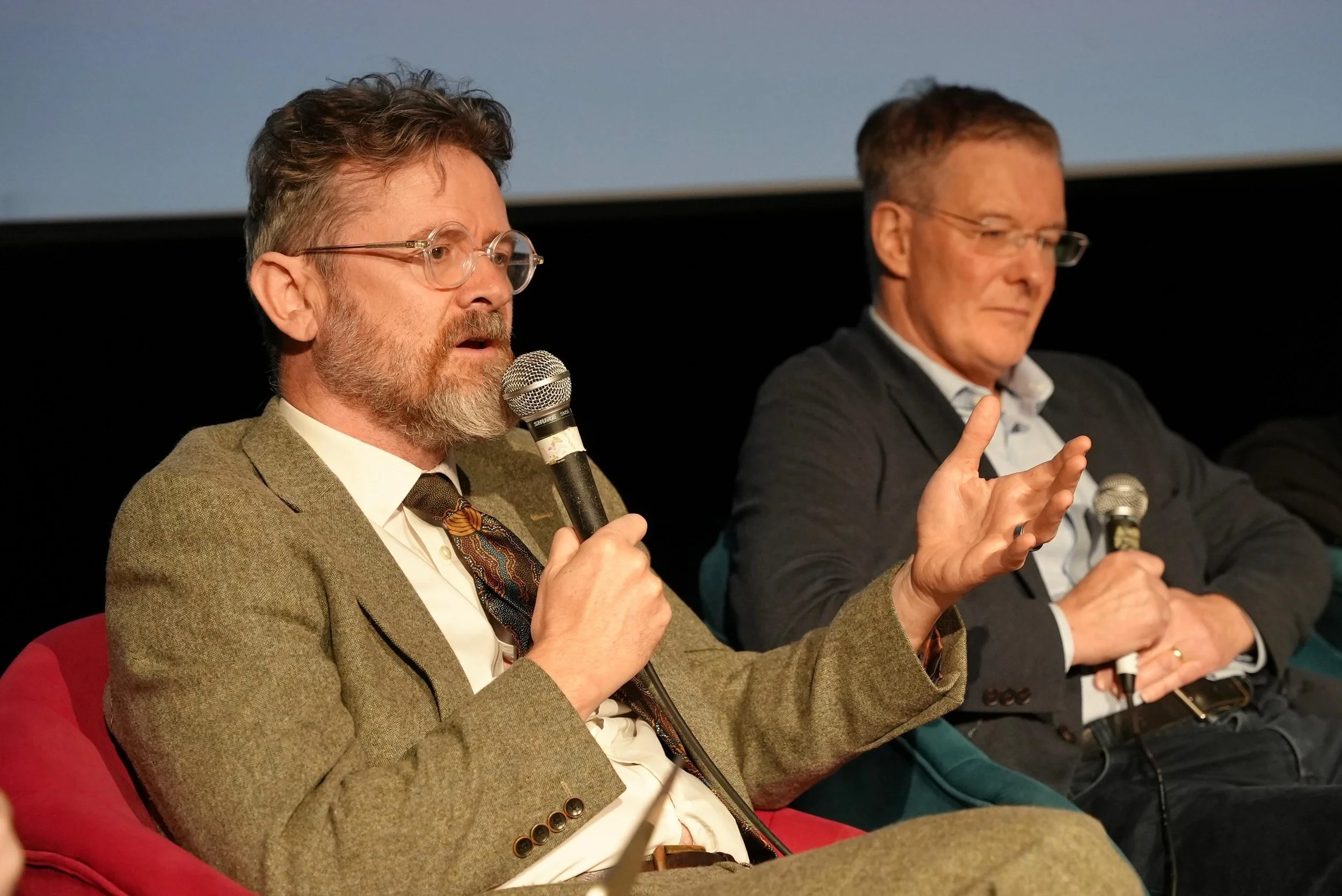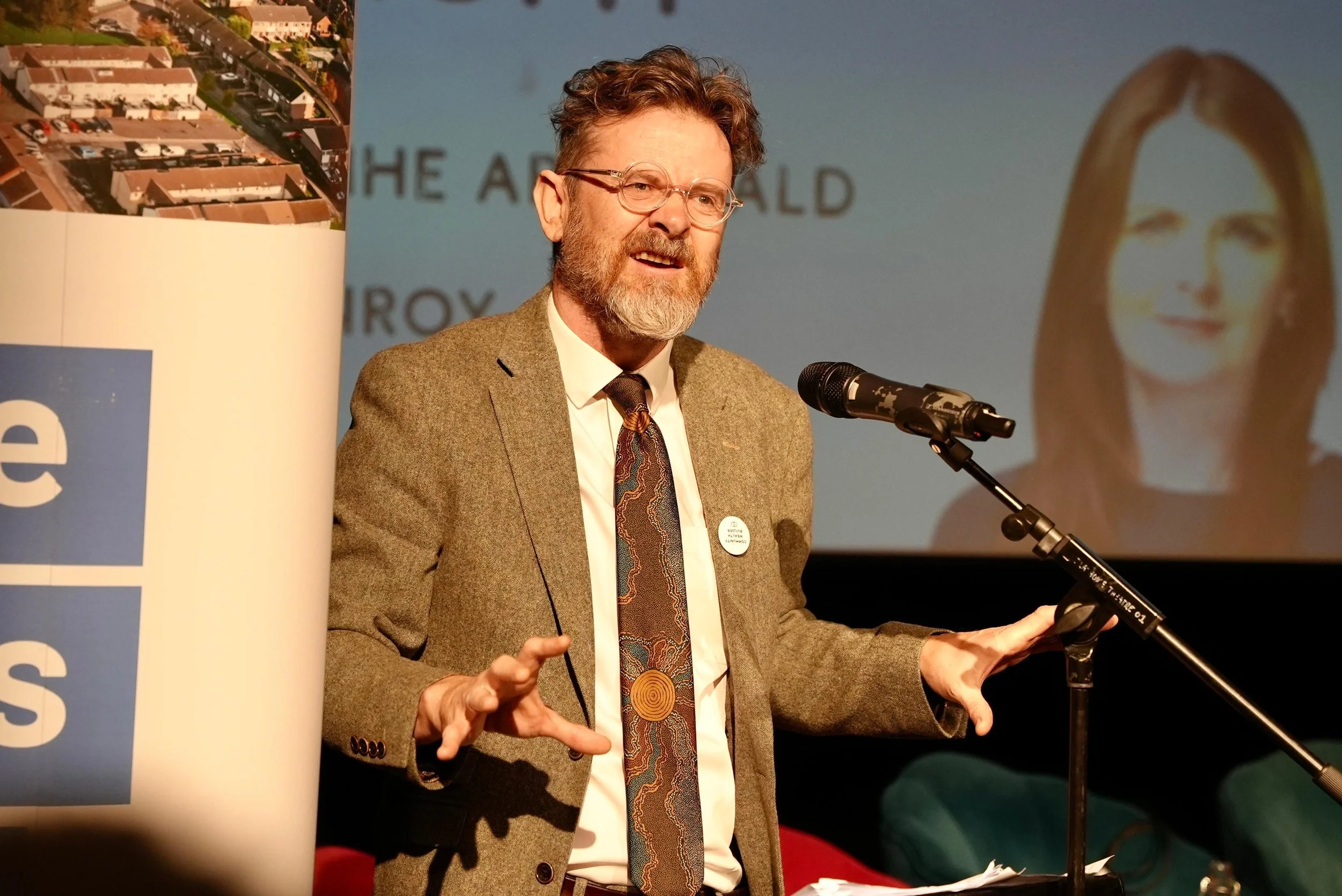Lessons for Northern Ireland on Community Wealth Building
October 16, 2025
This week, Neil McInroy, TDC’s Global Lead for Community Wealth Building (CWB), delivered a keynote address entitled “A Wealth Building Economy” at this year’s Development Trusts NI (DTNI) conference, in Derry, Northern Ireland. The following text is an adapted version of his speech.
Let me begin with a simple truth: Our economies are not working for everyone. The other truth is that we can do something about it. The economy is a social construct, not a natural given. We can, and must, make it anyway we choose.
The root of the word economy comes from the Greek word – Oikonomos - meaning “keeper of household”. The question for me therefore is: How do we bring the economy back home? Back to our families, neighborhoods, places?
To me, and to us at The Democracy Collaborative, Community Wealth Building is the way.
Across the globe, we see rising inequality, economic insecurity, and citizens left behind by models of growth that concentrate wealth and power. Our ecological catastrophe is born out of a material- and resource-extracting economic model. I often say in my speeches that we - whether in the U.S., Scotland or Northern Ireland - are at an inflexion point, moving from the old fossil fuelled, poverty producing economy, to one which is more just and environmentally sustainable. But we ain't there yet.
Whether in Belfast or Baltimore, Oban or Omagh, Daejong in South Korea or here in Derry, the story is often the same – local economies hollowed out, low pay or insecure work, lack of investment, public services under strain, and people feeling disconnected from the economic decisions that shape their lives. We don’t seem to have enough institutional, personal or workplace agency. We seem to take what we can economically get from those with bigger financial wealth and power. Let’s be frank, we aren’t active enough with our own agency. We accept more than we challenge, and we acquiesce rather than question.
Community Wealth Building is a response to all this, bringing the economy home and giving us more agency over it. Now, I can proselytize on Community Wealth Building until the cows come back to the byre, but there are at least three things you should know about CWB:
CWB is not just another policy framework to read through
CWB is not a new project to fit in with other projects
CWB is not just another thing to add onto a wish list of other “progressive initiatives”
Community Wealth Building is a movement of genuine, real change. It’s a movement that seeks to build agency and reclaim the economy for people and place and planet. It’s a movement that asks who owns the economy, who benefits from it, and how we can build systems that are democratic and inclusive through it.
Because at its heart CWB is about economic democracy. It’s about changing the patterns of wealth creation and control, so that wealth is not extracted and concentrated but retained, shared and recirculated. CWB is about shifting power so that communities, workers, and citizens have a real stake in the economy and a say in how it operates.
Implementing Community Wealth Building
And you’ll say: “These are all big ideas Neil, but how do they get implemented?”
To truly grow Community Wealth Building in any place, we must understand and act on what at The Democracy Collaborative we call the Three Legs of the Stool:
Practice
Policy
Networks
Each leg is essential. Together, they form the foundation for deep culture change. The kind of transformation that shifts not just programmes, but mindsets, institutions, and the economic systems.
Practice is about doing the work on the ground - Show and Tell
TDC and I have developed a Community Wealth Building Action Plan process — a structured tool, now being used across Scotland, parts of the U.S. and elsewhere – helping places turn principles into real action. This plan is all about changing patterns of wealth and investment across Five Pillars of action:
Workforce
Finance
Progressive procurement
Land and property ownership
Plural ownership
This plan is a guide rail and all the actions under these Five Pillars can be done now. In fact, some are already happening. But Community Wealth Building amplifies and scales them.
Policy is about creating the enabling environment
This means influencing governments and institutions to adopt CWB frameworks that support inclusive ownership, ethical procurement, fair employment, and the democratic control of assets. Our recent paper on the Enabling Conditions for Community Wealth Building outlines what’s needed, including legal scaffolding, financial tools, and institutional mandates that make CWB possible and sustainable.
Networks are about connection, learning, and movement-building
In the U.S. we’ve built a vibrant network of local leaders and practitioners sharing insights and driving change - a Community of Practice. Globally, we’ve convened an academic and researcher network to deepen the intellectual foundations of Community Wealth Building and support evidence-based innovation.
These three legs—policy, practice, and networks—must work together. If one is missing, the stool collapses. But when all three are present, Community Wealth Building can take root, grow, and flourish.
Barriers to Progressing Community Wealth Building
Of course, advancing Community Wealth Building is not without its challenges. Some of the biggest barriers are not technical, but cultural and political.
First, there’s what we often call the “aye been” culture, the idea that things have always been done a certain way, and should continue that way. This mindset can stifle innovation and prevent institutions from embracing new economic models, even when the old ones are clearly failing.
Second, we face deeply embedded economic and economic development traditions that prioritise investment, growth, and trickle-down economics. These orthodoxies dominate policy thinking and often marginalise approaches like CWB.
But let me be clear: Community Wealth Building is not about less economic innovation, or less investment. It’s not about turning our back on the global economy. It’s about getting more from it. CWB challenges us to build an economy based not on abstract growth metrics, but on the fundamentals of wealth, how it is created, who controls it, and how it is used productively, socially, and environmentally. It’s not about less dynamism, it’s about deeper dynamism. It’s about reimagining economic development so that it serves people and the planet, not just profit.
Third, there are those who are doing well out of the old economy, those who benefit most from concentrated wealth and power. These actors, whether in finance, property, or corporate sectors, have little incentive to support structural reform. And their influence can slow or block progress.
Fourth, we must contend with institutional thickness, the layers of bureaucracy, partnerships, and processes that can slow down or dilute transformative change. While collaboration is essential, it can also become a barrier when institutions are risk-averse, overly procedural, or locked into siloed ways of working. Community Wealth Building requires agility, experimentation, and a willingness to challenge conventional roles and relationships.
And finally, there is a lack of imagination and bravery. Too often, policymakers and institutions are afraid to challenge the status quo. They fear complexity, controversy, or failure. But without imagination, we cannot build new futures. And without bravery, we cannot confront the systems that perpetuate inequality.
Lessons for Northern Ireland
I believe this work on CWB holds valuable lessons for Northern Ireland in your own journey.
Northern Ireland has a rich tradition of community action, social enterprise, and cooperative endeavor. The social economy here is vibrant. Community development trusts and associations have deep roots. There is a strong sense of place, of solidarity, and of resilience.
And I say this not just as an outsider, but as someone who has been coming here for 50 years. And as someone involved in work in Northern Ireland for over 20 years. During my time as CEO of the Centre for Local Economic Strategies (CLES), we worked here including Derry, Belfast, and Mid Antrim and others. We explored progressive economic approaches, built partnerships, and supported local innovation. Indeed it is maybe over 15 years ago that I first came across DTNI. In fact, Belfast could have been the original European pilot for Community Wealth Building.
Back in 2012, we conducted an early anchor institution study in the city, mapping out how public sector spending could be redirected to support local enterprises and build community wealth. It was pioneering work. But for various reasons, it didn’t move forward at the time. So we took the lessons from Belfast and deployed them in Preston, England, where the model took root and grew into what is now widely known as the Preston Model of CWB.
That journey should tell us something. And it reminds me that change is slow, especially when it challenges entrenched systems and orthodoxies. But it also shows that seeds planted early can bear fruit elsewhere, and that Northern Ireland has long been part of the CWB story.
Fast forward to more recently to a commission, three years ago. A report was published on advancing Community Wealth Building in Northern Ireland. This work was undertaken by The Democracy Collaborative and laid out a compelling case for change and offered practical recommendations for embedding CWB principles into economic policy and development. That report remains highly relevant today, informed announcements yesterday, and it provides a foundation on which to build.
But there are remaining challenges. Economic inequality, regional disparities, and the legacy of division continue to shape the landscape. And too often, economic policy remains disconnected from the lived realities of communities.
Community Wealth Building offers a way forward. It provides a framework for inclusive economic transformation, one that builds on local strengths, redistributes power, and embeds democratic ownership.
Imagine a Northern Ireland where public procurement is harnessed to support local enterprises; where land and property are stewarded for community benefit; where finance flows to social goals; and where ownership is shared and inclusive.
A Northern Ireland where investment comes because it is not just a place with a strong social economy, but because it wants to make the whole economy more social.
This is not a utopian vision, it is already happening. We just need to amplify. But as said, this requires courage and leadership, and it requires a willingness to challenge the status quo. I have great hope for everywhere embarked on CWB. We’re a restless species that doesn’t take things lying down. That’s what fuels my hope.
So my message to policymakers, enterprise agencies, and community organisations in Northern Ireland is this: the time for Community Wealth Building is now. The tools exist. The models are proven. The appetite is growing.
Let us move beyond extractive economics. Let us build economies of belonging, cohesion, of dignity, and of justice.
Let us build Community Wealth.


